Sustainable shipping not only drives our ocean transportation business, it’s also our core purpose. Every day and in everything we do, we’re working to make shipping safer, greener and more responsible - both across our operations and the wider maritime industry.
Full steam ahead on decarbonization
 Jan Dieleman, President of Cargill’s Ocean Transportation
Reducing carbon emissions across the shipping sector is a complex process and requires systematic implementation at scale. It will be a big job with a significant price tag. During this process, Cargill wants to be a catalyst for change, leveraging our position at the center of the value chain to drive positive change.
Jan Dieleman, President of Cargill’s Ocean Transportation
Reducing carbon emissions across the shipping sector is a complex process and requires systematic implementation at scale. It will be a big job with a significant price tag. During this process, Cargill wants to be a catalyst for change, leveraging our position at the center of the value chain to drive positive change.
We’re investing significant sums in wind-assisted propulsion and green methanol fuel, not only because we want to shoulder our fair share of the risks with our commercial partners, but because we know that once these technologies prove their commercial value, the barriers for wider adoption will come down.
Behind the scenes, we’re:
- collaborating with customers to help them understand their carbon footprints and find ways to reduce them,
- working with owners to install power-saving devices on their ships and we’re financing these measures,
- playing an active role in creating the world’s first fully climate-aligned shipping lanes, known as green corridors.
There are many things that can be done right now, without any exotic new inventions. If our industry uses the remainder of this decade to implement these technologies at scale, we will see emissions from shipping begin to fall sharply in the 2030s. Together we can make zero carbon shipping a reality.
Explore our progress
Decarbonizing shipping is not a linear process, and neither is Cargill’s approach toward these 2050 industry targets, with short-, medium-, and long-term goals.
Learn about Cargill’s decarbonization journey by exploring our Decarbonization Reports.
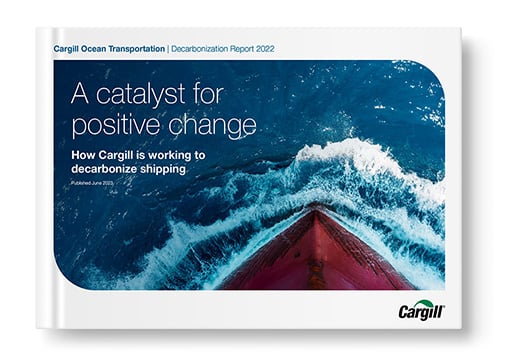
|
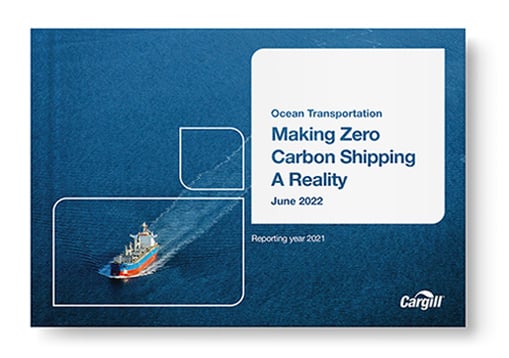
|
Innovative decarbonization solutions: What we can do today
If we’re smart about working together across our industry, we can start reducing fuel usage, costs and carbon emissions right away.
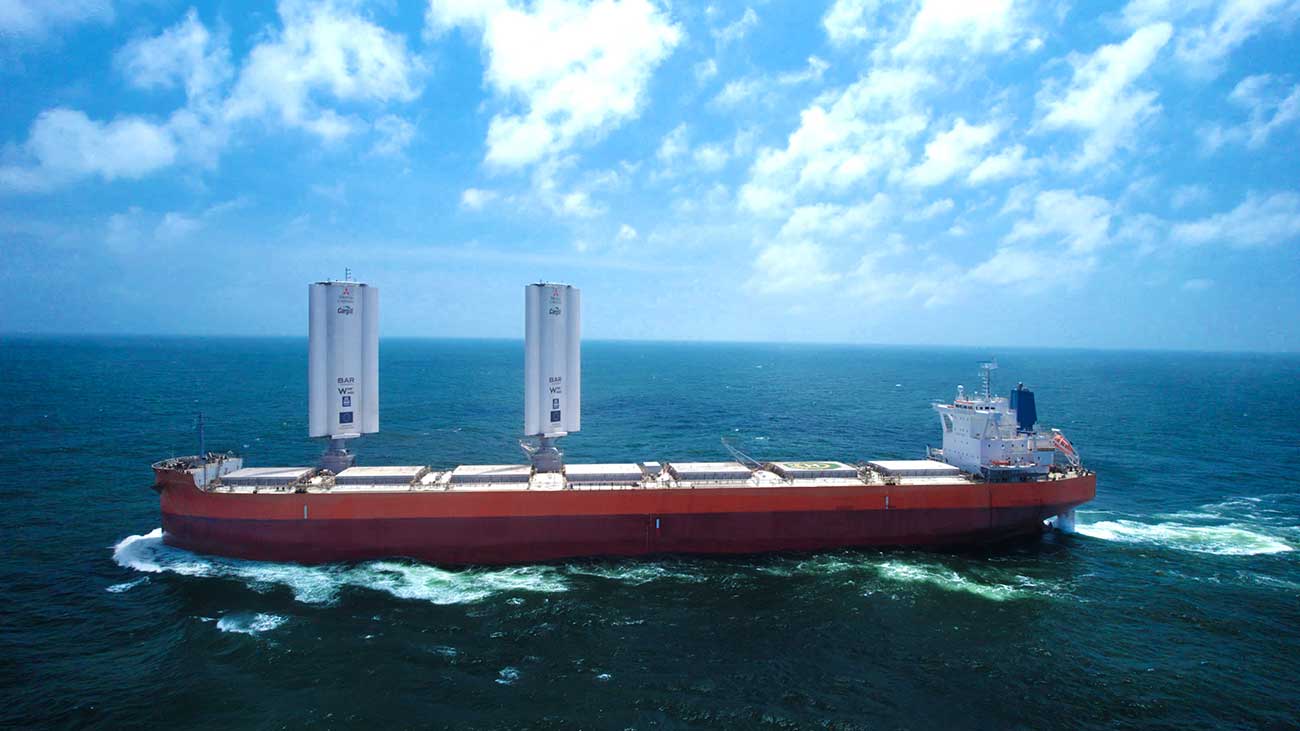
Cargill is leading the way with innovative wind-assisted propulsion, green methanol fuel and sustainable biofuels.
Committed to building safe, responsible and sustainable supply chains
At Cargill, our Environmental, Social and Governance (ESG) commitment is all about creating a more sustainable world. Every day, our teams around the world bring their passion and expertise to build supply chains that have a positive impact on people, our customers, and the planet we share. Read Cargill’s global ESG report for 2022 to find out more.
Below are some highlights of how Cargill is helping create a more sustainable maritime industry.
Environmental
Aligning on climate goals
The Sea Cargo Charter (SCC) brings together the world’s largest charterers of cargo ships with the aim of reducing the climate impact of the shipping industry. Cargill played a leading role in its founding in 2020. The organization provides a transparent, shared disclosure framework, based on a linear decarbonization trajectory aligned with the IMO’s goal of reducing GHG shipping emissions to net zero by around 2050. Using the SCC’s published methodology, every year, members assess their fleets’ carbon intensity against the SCC benchmark trajectory.
Advancing digital solutions
We invested in ZeroNorth, a provider of voyage, vessel, and bunker optimization software, to accelerate the use of digital solutions that decarbonize shipping. Through ZeroNorth, vessel owners and operators are able to help improve vessel performance, reduce carbon emissions, and increase earnings.
By working closely with ship owners and other key stakeholders and by investing in and piloting new technologies and fuel, we continue to make progress against our long-term emissions reduction goals. We are intensifying our efforts in this direction. To date, we have reduced CO2 emissions on over 30 vessels by up to 10%. We achieved this by installing energy-saving devices, including specialized hull paints, LED lights, and hydrodynamic-improvement appendages, which are devices or structures that are added to a ship or vessel to enhance its hydrodynamic performance.
Cutting emissions by parcelling
This year, we continued to make progress in optimizing emissions through parceling, which enables us to use bigger ships and maximize freight input. On parceling voyages we have measured up to 20% reduction in GHG emissions and a corresponding improvement in their Energy Efficiency Operational Indicator (EEOI). This is a measurement tool established by the International Maritime Organization.
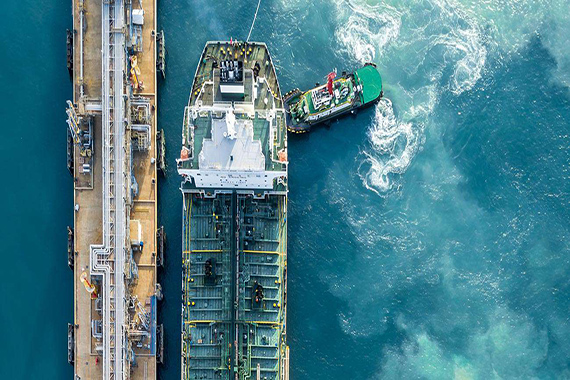
Social
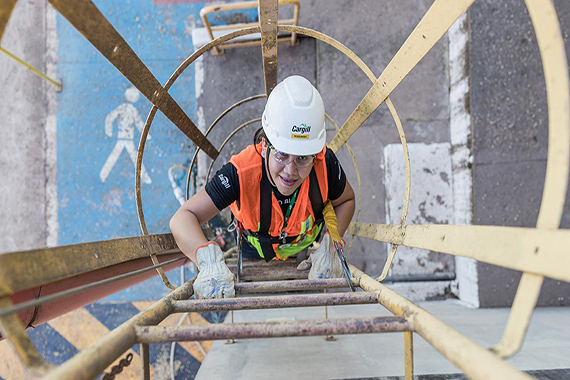
Taking people out of harm’s way
As part of our commitment to eliminating workplace hazards that can lead to injuries or fatalities, we are implementing changes such as using drones to conduct inspections, utilizing vertical drilling equipment to dislodge blocked materials, and adjusting product specifications to prevent moisture-induced blockages.
Setting safety standards onboard
Cargill is a longtime shareholder in RightShip, a maritime organization that focuses on safety, sustainability, and socially responsible practices across the supply chain. We are leading efforts with the RightShip coalition to advocate more broadly for policies that protect seafarers’ physical and mental wellbeing. These and other priorities are consistent with our support of standards set by the Global Maritime Forum.
Standardizing time on ships
Cargill Ocean Transportation, which charters a fleet of about 650-700 vessels at any given time staffed by more than 12,500 seafarers, does not employ the seafarers on the chartered ships. Nevertheless, out of concerns for their safety and to our commitment to human rights, Cargill instituted a practice of consistently tracking how long crews have been aboard our chartered ships and took steps to switch out crews whose time aboard was above the 11-month standard. As a founding signatory of the Neptune Declaration on Seafarer Wellbeing and Crew Change, Cargill is leading efforts that call for industry peers and governments to further address this pressing issue. We also support Human Rights at Sea, a non-profit organization with a global mission to end human rights abuses at sea.
Developing a diverse pipeline
The maritime industry has typically lacked gender diversity and Cargill is committed to correcting that inequity.
To build a pipeline of talent, our Ocean Transport business launched a two-year development program for trainees. By identifying graduates with high learning potential and diverse backgrounds, and providing hands-on training in areas such as trading, vessel operations, sustainability, digitalization, and business development, we aim to build a strong pipeline of future leaders in ocean shipping with the necessary skills for tomorrow's maritime industry.
In the first cohort, which drew participants from Europe and Asia, 75% were female, with many coming from backgrounds or fields outside of shipping. The second cohort, for trainees based in the U.S. and Singapore, began in summer 2022.
We have also co-signed the All Aboard Alliance, an initiative of the Global Maritime Forum, that will work toward a more diverse, equitable, and inclusive maritime industry to solve long-term challenges, including the global talent shortage.
Accessing mental health services
Alongside DNV Maritime and The Seafarers’ Charity, our Ocean Transport business, funded the development of a free-to-download app by Maritime welfare charity the Mission to Seafarers (MtS). The Happy at Sea app makes it easier for seafarers to access services to improve their welfare and mental health, especially whilst at sea.
According to the Q1 2023 results of the happiness index, access to welfare services was identified as one of the main areas of concern for seafarers. The new app has been designed to address this issue. It includes a low file size for an easier download experience during poor connection at sea, and seafarers who use the app will be able to pre-order services such as a port welfare officer visit and private counselling sessions from trained professionals.
